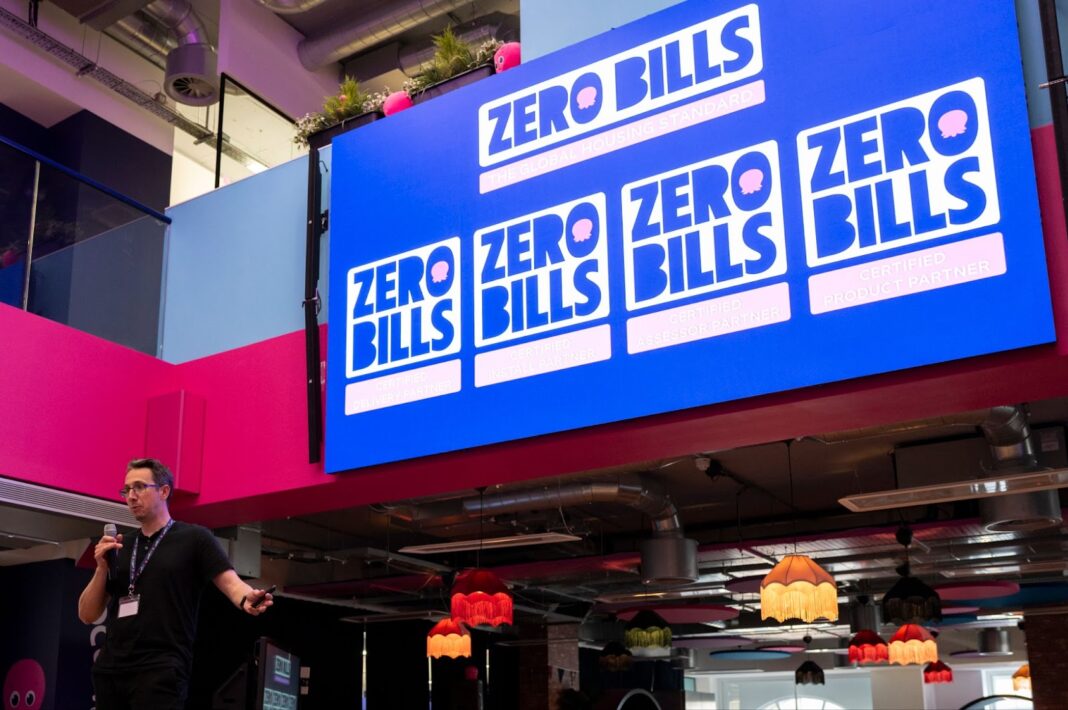Octopus Energy has unveiled a new global benchmark for sustainable housing with the launch of its ‘Zero Bills Standard’ – a framework designed to eliminate household energy bills while accelerating the decarbonisation of homes worldwide.
Positioned as a more consumer-focused alternative to existing sustainability frameworks such as the Future Homes Standard and Passivhaus, the Zero Bills Standard sets out technical criteria that combine green technologies including heat pumps, solar panels, and – critically – on-site battery storage.
Homes that meet these specifications qualify for Octopus Energy’s ‘Zero Bills’ tariff, which guarantees residents no energy bills for a period of five to ten years.
The tariff, first introduced in 2022, reflects a shift in how low-carbon homes are packaged and marketed – moving beyond efficiency compliance to a proposition that promises complete bill elimination. It is underpinned by a suite of integrated energy systems designed to generate, store, and use renewable electricity locally.
ZERO BILLS AWARDS
The launch of the standard was marked by the inaugural Zero Bills Awards in London, recognising developers and housing providers who have already met the new benchmark.
To date, more than 1,200 homes have been accredited under the scheme, spanning a mix of affordable, private rent, shared ownership, and private sale developments.
Octopus has ambitious plans to scale the initiative, targeting 100,000 Zero Bills homes globally by 2030.
Octopus has ambitious plans to scale the initiative, targeting 100,000 Zero Bills homes globally by 2030. The standard is already being rolled out beyond the UK, with active developments in Germany and New Zealand.
Unlike broader regulatory standards that emphasise energy efficiency and the phasing out of fossil fuel systems, the Zero Bills Standard reframes the conversation around consumer outcomes – eliminating the energy bill entirely, rather than just reducing it.
It also introduces a commercial incentive for developers and landlords: homes meeting the standard may prove more attractive to increasingly cost-conscious and climate-aware tenants and buyers.
VERTICAL INTEGRATION
For the energy industry, it represents another example of vertical integration – where energy suppliers extend into hardware, homebuilding, and tariffs to control the entire value chain from generation to consumption.
As net zero targets tighten and home energy costs remain high on the political agenda, the arrival of a global Zero Bills Standard marks a potentially disruptive step forward in how residential energy is produced, consumed and financed.
GAME-CHANGER

Nigel Banks, Director of ‘Zero Bills’ at Octopus Energy, says: “The Zero Bills Standard is a game-changer for sustainable living. By going beyond current housing standards, we’re empowering housebuilders, developers and local authorities to create homes that are not only better for the planet, but better for people’s wallets too.
“Congratulations to all the Zero Bills Awards winners who are already making sustainable and zero-energy-bill living a reality.”
*The winners of the Zero Bills Awards were revealed on the night, recognising exceptional work across nine categories in delivering and scaling up sustainable homes
‘Zero Bills’ Housebuilder of the Year: Thakeham
Housing Association of the Year: Clarion Housing Group
Large Housebuilder of the Year: Hill Group
Medium Housebuilder of the Year: Thakeham
Small Housebuilder of the Year: Verto
Retrofit Project of the Year: Lloyds Living
Build-to-Rent Provider of the Year: Packaged Living
Product Innovation of the Year: gs8
Supply Chain Partner of the Year: UPOWA










